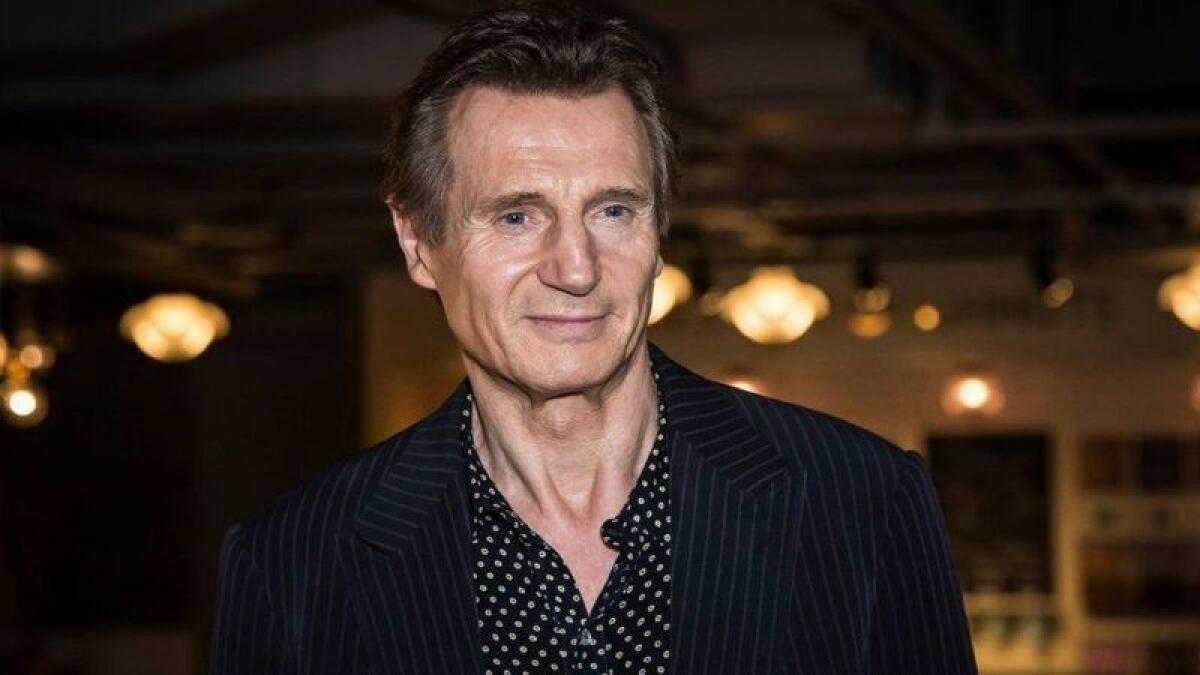Commentary: Liam Neeson’s blurred the line this week between real life and vigilante movies

- Share via
Liam Neeson’s characters are avatars of vengeance.
They are reticent, brutal and deadly, plying the world for justice in a sacred quest to empower the everyman. They are flawed and often misunderstood, but their resilience adds nobility to their suffering, even as they blow up buildings, kill armies of bad guys and leave streets and trains scorched and smoldering. They are bankable vicarious fantasy.
But Neeson — star of the $1-billion “Taken” franchise — blurred the line between cinema and real life this week after he told a British newspaper that four decades ago he strolled the streets with a club hoping to kill a black man after a friend had been raped. The comment was quickly condemned as hateful and chilling, opening another disturbing and complicated window on race.
“I went up and down areas with a [club], hoping I’d be approached by somebody,” said Neeson, 66, who was born in Northern Ireland and lived through the clashes between Protestants and Catholics. “I’m ashamed to say that, and I did it for maybe a week — hoping some black bastard would come out of a pub and have a go at me about something, you know? So that I could kill him.”
Public outcry lighted up social media. A former amateur boxing champion in his youth, Neeson took to “Good Morning America” on Tuesday in damage control remorse: “I had never felt this feeling before, which was a primal urge to lash out,” he said, adding, “I was trying to show honor, stand up for my dear friend in this terrible medieval fashion. I’m a fairly intelligent guy, and that’s why it kind of shocked me when I came down to Earth after having these horrible feelings. Luckily, no violence occurred ever, thanks be to God.”
“I’m not a racist,” he told host Robin Roberts.
Standing up for the victim, or seeking revenge for a heinous crime, is the grist of many of Neeson’s films, including his new “Cold Pursuit.” The stories surge with populism, giving a man his say, his chance to set things right and re-arrange the balance of power that he believes is so often skewed against him. It is not just his guns and knives, but his righteousness and tragic-hero resolve that arm and purify him against the world’s cruelties and sins.
“It’s about the man that stands up and decides enough is enough. Gary Cooper. John Wayne. Jimmy Stewart,” the 6-foot-4-inch Neeson, who still does his own fight scenes, told The Times last year. “God, I would have loved to have been back in those days. . .I like the idea of playing an everyman. You see these anonymous men coming into the city, getting on with their jobs and their work. It’s nice to enter that kind of world, being sort of Mr. Average. He’s got a mortgage and a wife and a kid about to go to college. We’re always worried about where the money’s going to come from.”
From Charles Bronson to Mel Gibson, action stars in revenge films tread tricky moral lines. The villians — often African-Americans or ethnic minorities — are subjected to the kind of vigilante and frontier justice so mythologized in the American West. The rule of law may be a splendid necessity, the underpinning of democracy, but a man, and at times a woman, in movies can act on his or her primal urges. Such instincts are potent in times of political and economic uncertainty as was Northern Ireland 40 years ago and America today.
It draws a line between the other, hardens distinctions and the kind of tribalism that has so infected and shaped America’s discourse these days.
“We all pretend we’re politically correct,” he added. “In this country, it’s the same in my own country. Sometimes we scratch the surface and we discover racism and bigotry and it’s there.”
When Roberts, who is black, asked him what lesson he learned, he threw it back to her. “We have to own up,” she said. “This [story] wasn’t discovered by somebody. You admitted this. This isn’t a ‘gotcha.’ So I give you credit there. But also having to acknowledge that the hurt — even though it happened decades ago — the hurt of an innocent black man, knowing that he could’ve been killed for something he did not do because of the color of his skin.”
Neeson’s comments can be read as a bit of honesty to talk about the things we seldom talk about. But to “scratch the surface,” as he said, is one thing in film but quite another in real life. In movies, the consequences of scratching the surface usually end tidy, the resolution complete. In reality, breaking the veneer reveals the deeper truths, those tics and blemishes that leave us exposed and unadorned and subject to a very different kind of justice.
Times staff writer Nardine Saad contributed to this story.
See the most-read stories this hour »
Twitter: @JeffreyLAT
More to Read
Only good movies
Get the Indie Focus newsletter, Mark Olsen's weekly guide to the world of cinema.
You may occasionally receive promotional content from the Los Angeles Times.











